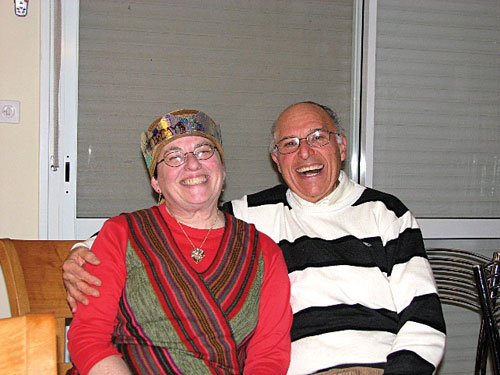.jpg)
.jpg)
Bet Shemesh—In the Modern Orthodox community, it is becoming popular to make aliyah. It is, however, less common for community leaders from chutz la aretz, to start from scratch in Israel leaving their established positions behind.
The former driving force behind Paramus’ Yavneh Academy, one of the pioneering day schools in Bergen County, Rabbi Eugene Kwalwasser—originally from Chicago, then Cleveland, and eventually Fair Lawn—made that move five years ago. Involved in American-Jewish education for 42 years, he spent 31 of them at Yavneh, where he served as principal of the school and its manhig ruchni.
Why did he and his wife Edna decide to make the drastic change?
“My wife and I both grew up in a very Zionist atmosphere,” said Kwalwasser. Both of my parents, especially my mother, taught us from a young age, that it was important to live in Eretz Yisrael.”
When he and his wife married in 1968, they went to Israel on their honeymoon and instantly fell in love with the land, forming a special bond with it. Their parents, on the other hand, weren’t in favor of them starting their lives in Israel, because they worried that if the couple had children, they would rarely have the time or money to travel and would therefore not get to know their grandchildren.
So the young Kwalwassers decided instead to start their family in the States,with all good intentions, but as time went on and their children grew up, the prospect of moving to Israel became less doable. He said, “When shlichim would visit Yavneh, they would always tell me; ‘Rabbi, the next generation of American Jews will be the ones who will come to Israel, and when you are ready to retire, you should come as well.’“
This idea, always at the back of the Kwalwasser’s minds, came closer to being realized when their children Binyamin and Miriam moved to Israel, and raised their families there. The Kwalwassers always sensed that when they were ready to retire, they would move, and after the rabbi stepped down at Yavneh, they knew that the time was right.
“If there’s one lesson that I could teach from my story,” Rabbi Kwalwasser concludes, “it’s that families who are considering aliyah should come when they and their children are younger. This makes it easier for the parents to integrate into society and for the children to integrate into the Israeli schools. It’s much harder to make the move as the family grows older.”
While he no longer has the responsibility of running Yavneh, he has himself in many community projects in Israel over the past five years, and has grown even more through them. He is the mashgiach ruchni of Yeshivat Lev Hatorah, an American yeshiva that his son Rav Benjy founded, and he and his wife run the business office. Kwalwasser is also a volunteer for the Bet Shemesh office of Bituach Leumi (Israel Social Security), where he helps Anglos who don’t speak Hebrew well negotiate the system and navigate the untamed waters of Israeli bureaucracy.
Kwalwasser is also still learning, and takes classes in Michlelet Herzog (Herzog Judaic Studies Institute of Higher Learning) in Gush Etzion once a week with classically trained teachers like Rav Elchanan Samet. He and his wife also study Nevi’im at Pardes complemented by trips to the very places mentioned in the texts.
The couple also makes sure to spend plenty of time with their grandchildren and their friends from around the country. “Once you put all of these activities together… most days fly by like crazy and before we realize it, the week is over. When one retires from full work, there must also be a plan as to how that individual will spend the newfound time. Nature abhors a vacuum, and having nothing to do with no plan can be disastrous.”
Moving to Israel and leaving the familiar comforts of the United States behind always requires some adjustment, and there are some things that are never the same. When asked what he misses most, he admitted that he misses his son Avi, daughter-in-law Danielle and their children in Stamford ,as well his two sisters and other friends who still live chutz la aretz.
Besides people, Rabbi Kwalwasser asked, “What else is there to miss? We visit the United States for the gashmiut (materialism), but we stay in Israel for the ruchniut (spiritualism). We enjoy walking through the streets, seeing all of the Judaism and holy sites around us and knowing that we are part of it… There is something very special about living in Israel despite the difficulties, because people are just happy here, no matter how much or little they have. We are delighted to be part of this.”
When leaders retire and move on, it is often a challenge to be as productive as they were before. But, as American motivational author Catherine Pulsifer once wrote “Retirement may be an ending, a closing, but it is also a new beginning.” Rabbi Kwalwasser, now retired in Israel, is certainly proof of this.
By Tzvi Silver










